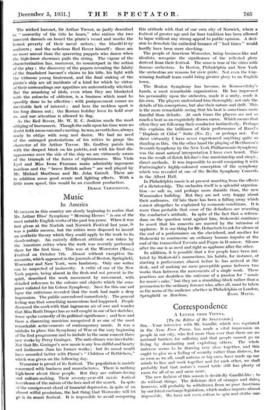MUSIC In America
MUSICIANS in this country are slowly beginning to realize that Mr. Arthur Bliss' Symphony " Morning Heroes " is one of the most notable English works of the past ten years. When it was first given at the Norfolk and Norwich Festival last year, it was a public success, but the critics were disposed to invent an aesthetic theory which they could apply to the work to its disadvantage. An entirely different attitude was taken by the American critics when the work was recently performed there for the first time. This was at the Worcester (Mass.) Festival on October 7th. Almost without exception the accounts, which appeared in the journals of Boston, Springfield, Worcester and New York, were laudatory. Only one writer can be suspected of insincerity. A critic of one of the New York papers, being absent in the flesh and not present in the spirit, described the work movement by movement, with detailed reference to the colours and objects which the com- poser enlisted for his Colour Symphony. Save for this one sad lapse the criticisms revealed that the work had made a deep impression. The public surrendered immediately. The general feeling was that something momentous had happened. People discussed the work with that ingenuous air of awe and wonder that Miss Ruth Draper has so well caught in one of her sketches. Some spoke earnestly of its political significance ; and here and there a discerning musician recognized it as one of the most remarkable achievements of contemporary music. It was a mistake to place this Symphony of War at the very beginning of the first programme and to include in the same concert.three new worki by Percy Grainger. The anti-climax was inevitable. Not that Mr. Grainger's new music is any less skilful and hearty and frolicsome than his former works ; but its mood would have accorded better with Pierne's " Children of Bethlehem," which was given on the following day.
Worcester is proud of its festival. The population is mainly concerned with business and manufactures. There is nothing high-brow about these people. But they are culture-loving and culture-seeking. Their seventy-year-old music festival is evidence of the nature of the love and of the search. In spite of the omnipresent aloud of financial depression, in spite of an almost wilful pessimism, the last thing that Worcester will let go is its music festival. It is impossible to avoid comparing
this attitude with that of our own city of Norwich, where a festival of greater age and far finer tradition has been allowed to lapse without any strong appeal to public opinion. A deci- sion to demolish the cathedral because of " bad times " would hardly have been more shocking.
The people of American Worcester, being business-like and idealists, recognize the significance of the reflected glory derived from their festival. The same is true of the cities with famous orchestras. In Boston, Philadelphia and New York the orchestras are reasons for civic pride. Not even the Cup- winning football team could bring greater glory to an English town.
The Boston Symphony has become, in Koussevitzky's hands, a most remarkable organization. He has impressed his personality upon the orchestra, made it a unity, made it his own. The players understand him thoroughly, not only the details of his conceptions, but also their nature and drift. This is the more remarkable seeing that his beat is sometimes more fanciful than definite. At such times the players see not so much a beat as an exquisitely drawn curve. Which means that often they are following their conductor instinctively. Perhaps this explains the brilliance of their performance of Ravers " Daphnis et Chloe " Suite (No. 2) ; or perhaps not. For sheer virtuosity I have never experienced anything quite so dazzling as this. On the other hand the playing of Beethoven's Seventh Symphony by the New York Philharmonic-Symphony was the most natural interpretation I have ever heard. This was the result of Erich Kleiber's fine musicianship and simple, direct methods. It was impossible to avoid comparing it with Furtwangler's highly-coloured conception of the symphony which was revealed at one of the Berlin Symphony Concerts in the Albert Hall.
In Philadelphia music is at present smarting from the effects of a dictatorship. The orchestra itself is a splendid organiza- tion—as safe as, and perhaps more durable than, the new Wanamaker building. But they are not very happy about their audiences. Of late there has been a falling away which cannot altogether be explained by economic conditions. It is more than probable that sonic of the defaulters are resenting the conductor's attitude. In spite of the fact that a referen- dum on the question went against him, Stokowski continues to assert that his concerts are marred by the intrusion of applause. It is one thing for Mr. Dohnetsch to ask for silence at the end of a performance on the clavichord, and another for Stokowski to contravene an ordinary human impulse at the end of the transcribed Toccata and Fugue in D minor. Silence after the one is as meet and right as applause after the other.
In addition, it is possible that a few people have been irri- tated by Stokowski's mannerisms, his habits, for instance, of starting a performance almost before he has arrived at the desk, and of making no more perceptible pause between two works than between the movements of a single work. These practices are doubtless the outcome of a passion for " music for music's sake," but they are a stumbling-block rather than a persuasion to the ordinary listener who, after all, must be taken as the norm of the audience whether in Philadelphia or London,










































 Previous page
Previous page